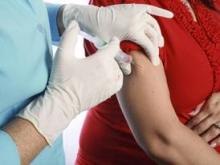All pregnant women should receive a dose of the Tdap vaccine, whether she has received the vaccine previously, the Centers for Disease Control and Prevention’s Advisory Committee on Immunization Practices recommended.
At a meeting on Oct. 24, the committee voted 14-0, with one abstention, to support the recommendation proposed by the ACIP pertussis vaccine work group that providers of prenatal care implement a Tdap immunization program for all pregnant women and that health care personnel "should administer a dose of Tdap during each pregnancy, irrespective of the patient’s prior history of receiving Tdap." If not administered, during pregnancy, "Tdap should be administered immediately post partum," according to the recommendation.
The recommendation is a change from the previous recommendation made by ACIP in June 2011, which says that that Tdap should be administered during pregnancy "only to women who have not previously received Tdap." The current recommendation also states that women who do not receive the vaccine during pregnancy should be vaccinated immediately post partum.
Optimally, women should receive Tdap between 27 and 36 weeks’ gestation, to maximize the maternal antibody response and passive transfer of antibodies to the infant, said Dr. Jennifer Liang, the lead CDC member of the ACIP pertussis vaccine work group. Based on work group’s review, the evidence is "reassuring" – that two doses of Tdap are safe, she said.
Dr. Liang said that only about 2.6% of pregnant women are vaccinated with Tdap during pregnancy and that the work group is attempting to remove barriers to improve the uptake of the vaccine.
The work group concluded that Tdap maternal pertussis antibodies would wane greatly between subsequent pregnancies, and that a single Tdap dose during one pregnancy was not sufficient to provide adequate protection for subsequent pregnancies. Considering that the number of children born per woman in the United States is about two, a "very small proportion of women – about 5% – would receive four or more Tdap doses, she said.
The number of expected pertussis cases in the United States this year is expected to be the highest since 1959, with more than 32,000 cases reported to date.* There have been 16 deaths so far, and most were in infants, who also have the highest rates of hospitalization, according to the CDC.
In the United States, the rate overall is 10.6 cases/100,000 population, but the rate varies considerably by state. In infants under age 1 year, the rate ranges from 20-100 cases/100,000.
The work group has requested that the CDC conduct safety studies to address the potential increase in severe adverse events when Tdap is given in subsequent pregnancies, she said.
"This is a great opportunity for obstetricians to help their patients protect their newborns and themselves. I urge all obstetricians to recommend and give Tdap vaccine to their pregnant patients," Dr. Richard Beigi, a member of the American College of Obstetricians and Gynecologists immunization work group and the ACIP pertussis vaccines work group said after the vote. Dr. Beigi was not at the meeting.
There are 15 experts in immunization-related fields on the ACIP committee, which develops written recommendations for the routine administration of vaccines to children and adults in the civilian population.
* This story was updated on 10/26/2012.


